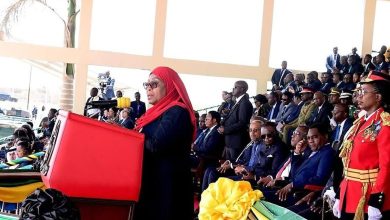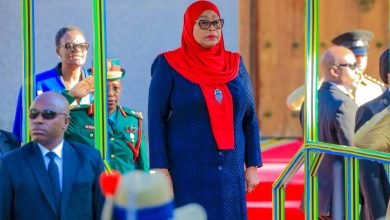Follow lawful channels when expressing grievances, youth told

DAR ES SALAAM: RESIDENTS and business owners in various parts of Dar es Salaam have called on young people to uphold peace and follow lawful procedures when expressing their concerns, describing the recent week-long disruptions as a serious blow to livelihoods and social stability.
For them, consequences of violence and destruction reach far beyond immediate loss, they said, it cripples generations to come, saying it is the responsibility of every citizen, leader and young person to protect peace, for peace is a greater inheritance than wealth.
At Mvuti Market, trader Juma Kambangwa said the unrest that erupted during and after General Election on October 29th this year, severely affected business operations and disturbed community peace.
“The effects were huge. We couldn’t work or even find peace of mind. For the whole week, there was no business at all because people were afraid to come to the market. It even became difficult to pay taxes since we were opening late and closing early. Expenses remained high while income dropped sharply,” he said.
Mr Kambangwa urged the youth to avoid being misled by online content and instead, respect the country’s legal framework.
“Young people today are often influenced by social media. They see chaos in other countries and feel tempted to imitate it. My advice is that they should think carefully about the consequences before taking part in demonstrations again,” he added.
Mvuti resident Zuwena Teikwa echoed the concerns, saying life became unbearable during the days of unrest.
“As a mother of seven, it was extremely hard to find food because prices suddenly skyrocketed. Imagine paying a thousand shillings for a single tomato, that was something new and shocking,” she said.
Ms Teikwa urged young people to reflect on the damage caused, especially to public infrastructure and to abandon actions driven by anger.
“The government should make sure such incidents do not happen again. Tanzania is a model of peace not only in Africa but in the world. It’s easy to destroy peace, but rebuilding it is difficult. Let us continue to promote love, peace and unity as before,” she said.
In Chanika, resident Seif Mwera said that safeguarding peace is a shared responsibility.
“As residents, parents and Tanzanians, it’s our duty to protect the peace we enjoy. We must not only advise the youth but also those who incite unrest to stop and do what is right. Parents, too, must play their part by teaching their children the value of peace,” he said. Another Chanika resident, Hussein Mawanja, noted that some youth have a poor understanding of life’s real challenges.
“Many young people think life is easy, but the truth is, it’s not. They should avoid joining meaningless groups and instead focus on building their future. Peace is precious and we must work hard to protect it,” he said.
For others, the unrest brought direct financial losses. Fred Halla, owner of Urithi Arts in Mbezi, said his art studio and stationery shop were set on fire.
“It wasn’t just an office; it was also my gallery and the source of income for my family. Losing it is devastating,” he said.
Janeth Mlozi, a businesswoman from Kariakoo said the disturbances disrupted daily economic activities.
“Our daily lives changed completely. Many of us depend on daily business to earn a living, so during those days it was extremely difficult to even find food,” she explained.
She called on the youth to stop copying negative behaviour and instead focus on hard work and peacebuilding.
“Let’s abandon imitation and work hard so that we can return to our normal lives, where we can move freely and work at any time,” she said.
A resident of Tabata Kisukuru in Dar es Salaam, Mr Abdallah Hussein said violence and killings tear apart the social fabric of communities. They erode trust among people, institutions and even within families.
“Fear spreads quickly, neighbours begin to distrust one another and society becomes divided. Children grow up surrounded by fear, a condition that leaves deep psychological and social scars lasting well into adulthood,” he said.
He said the destruction of property affects every aspect of life. “Businesses shut down, jobs disappear and investors withdraw while the government loses revenue as the cost of reconstruction rises sharply. This should not be allowed to continue in our country,” he said.
On lessons for Tanzanian to take, Mr Hussein said young people are the strength of the nation and the leaders of tomorrow and they must understand that real change is achieved not through violence, but through education, dialogue and perseverance.
“They should learn to respect political, religious and social differences and to value unity over division. Tanzania’s future depends on youth who choose peace, dignity and respect for humanity,” he said.
Recently, Brigadier General (Rtd) Ambassador Francis Mndolwa appealed to citizens to avoid prolonging political divisions and instead focus on nation-building.
Ambassador Mndolwa said it is the duty of every Tanzanian to preserve peace and security, stressing that development cannot thrive in an environment of unrest or conflict.
“Everyone must ensure that peace prevails so that planned development projects can be implemented. This responsibility does not rest solely on leaders; it belongs to every Tanzanian, wherever they may be,” he said during an interview with TBC, urging citizens to support the government in implementing its development agenda and fulfilling the aspirations of the people.
Drawing on his experience as the then Tanzania’s Ambassador to Burundi, where he was involved in peacebuilding efforts between 1993 and 2010, Amb Mndolwa underscored the importance of involving all citizens in maintaining stability.
“Achieving peace requires full participation from all citizens because development is impossible where there is disorder,” he said, cautioning against acting on emotion or mob influence.
He further stressed that no meaningful progress can be achieved through chaos and that grievances should be addressed through constitutional channels and constructive political dialogue.
On national unity, Amb Mndolwa urged leaders to stay close to the people.
“Leaders should be part of the communities they serve. When citizens are confident that their leaders are with them, peace and progress follow. But when leaders distance themselves, unrest becomes inevitable,” he said.
He added that public participation in development initiatives is vital and citizens should be kept well-informed about ongoing projects and their benefits.
He also called for renewed commitment to reconciliation, dialogue and collective discussion from village level to the national stage, to strengthen unity and shared purpose.
Former Tanzanian Ambassador to the African Union and Nigeria, Dr Msuya Mangachi said that while citizens have every right to demand their rights, those rights come with responsibilities.
“One cannot claim a right without respecting the procedures and laws that govern its realisation. Too often, people demand rights without considering the constitutional framework, which can lead to unrest,” Dr Mangachi said.
ALSO READ: Public servants told to promote peace
He added that making demands without following due process encourages shortcuts, which often escalate into conflict.
Dr Mangachi also underscored the importance of ethics and accountability among leaders, stressing that they must act with integrity and declare their assets as required by law.





